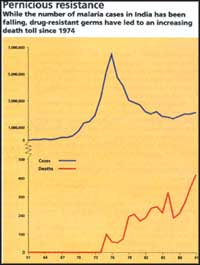
The microbes strike back
Diseases that were cheerfully believed to have been eradicated are inexplicably cropping up again in India in deadlier, drug resistant forms

Diseases that were cheerfully believed to have been eradicated are inexplicably cropping up again in India in deadlier, drug resistant forms
<p>Brick makers in Bangladesh using conventional methods blamed for polluting the air, now seek two more years to be ready for conversion into environment-friendly technologies though they have already enjoyed around three years for this. Read more in this first Monthly Bangladesh State of the Environment Report published by the South Asia Environment Portal. September 2013 Edition is out! Download, Read and Share. Happy reading!</p>

<p>Multinational companies operating in the Asian growth economies will be exposed to spiralling environmental risks over the coming decades, according to Maplecroft Climate Change and Environmental Risk Atlas 2013.</p>
Nepal is slated to be a major hydropower supplier in South Asia with the recent signing of a Memorandum of Understanding (MoU) with the Australian government for a US$ 590-million 360-megawatt project on the Karnali river. But Nepal"s big projects, like t

A book by Adam Rome
Gerald Leach is a senior research fellow at the Stockholm Environment Institute SEI in London. He has written extensively on rural energy issues in developing countries at the SEI and earlier at the International Institute of Environment and Development
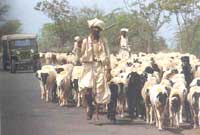
Hemmed in by intensive agricultural and industrial activity, pastoralists are finding less room to carry on their activities. This could upset the delicate balance of agricultural ecosystems.
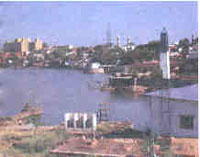
Callous unconcern, pollution, encroachment and politics is finishing off the lakes in Bhopal and Indore
<font class='UCASE'>D K Chaddha</font> , chairperson, Central Ground Water Authority CGWA , New Delhi, talks to <font class='UCASE'>Jitendra Verma</font> on the state of groundwater in India
<p>With release of genetically modified Bt brinjal for commercial cultivation Bangladesh is first country in the South Asia to cultivate any genetically modified food crop. Read more in this March 2014 edition of the Monthly Overview on State of Environment, Bangladesh.</p> <p> </p> <p> </p> <p> </p>

Martha Wangari Karua is a cabinet minister for water resource management and development in Kenya. A lawyer by profession, she is among that rare breed of no nonsense politicians fighting to provide water for all in her water scarce country. In an exclusi

The plan to rehabilitate the victims of the devastating earthquake that shook Latur last year ignores the needs of the villagers and introduces alien construction techniques
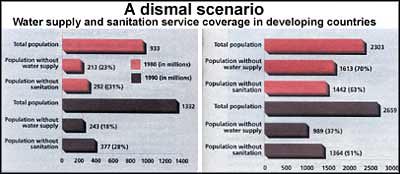
Water. A resource whose scarcity and inefficient allocation gives enough cause for concern. A concern which could find a solution in the concept of market-based allocation and tradeable water rights

An 85-year-old lady was having problems getting her passport. She needed it to go and live with her children abroad. The status, the website showed, was delivered. Visits to the passport office

Historians generally agree that the death of the Indus Valley civilisation did not occur because of a single dramatic event, but came about due to several factors. One probability is that the people of that age mismanaged natural resources
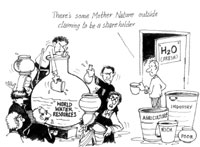
Industry s role in managing the dwindling freshwater resources of the world was highlighted at the sixth session of the Commission for Sustainable Development at New York. But countries of the South are hesitant about treating a social resource as a
Delhi was once green, cool and never water

<p><span style="font-size:14px;"><strong>Rain Water Harvesting</strong></span></p> <p><span style="font-size:14px;"><strong><img alt="Rain Water Harvesting-Bangladesh" src="http://www.indiaenvironmentportal.org.in/files/country/bangladesh/rainwater_harvesting_hl.jpg" style="width: 525px; height: 297px;" /></strong></span></p> <p>Rainwater harvesting is one of the feasible options of fresh water sources in the coastal areas of Bangladesh and recently a lot of initiatives and programme were undertaken to promote and install rainwater harvesting systems both in the coastal and arsenic affected areas in Bangladesh. Moreover, every year the country is also blessed with ample rain. The average annual rainfall in Bangladesh is about 2200 mm, seventy-five percent of it occurs between May and September.</p>
"DELHI will not have to beg for water any more," was the preening claim of chief minister Madanlal Khurana on May 12, after his counterparts from Rajasthan, Himachal Pradesh, Haryana and Uttar

Indian lakes are no longer serene waterbodies. Instead, they have become stinking cesspools, a result of continuous inflow of sewage and massive siltation. As the lakes die a premature death, the question that arises is who is responsible for this sorry s